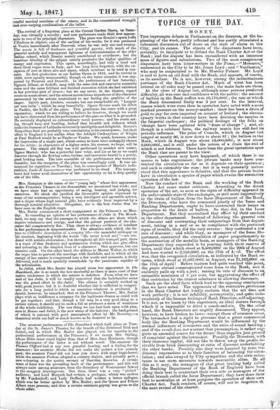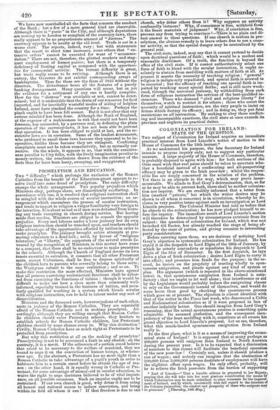TOPICS OF THE DAY •
M 0 N E Y.
Tauimpromptu debate in Parliament on the finances, at the be- ganinng of the week, partly reflected and has partly stimulated a vehement discussion out of doors on the state of alarm in the City, and its causes. The objects of the disputants have been, severally, to inculpate or to defend the Bank Charter Act or the Bank ; and the dispute has been encumbered with an immense mass of figures and calculations. Two of the most conspicuous disputants have been letter-writers in the Times,—" Mercator," understood in the City to be Mr. Jones Loyd ; and " Vindicator," who may be conjectured to be Mr. Horsley Palmer. Mr. Loyd is said to have an old feud with the Bank, and appears, of course, as its assailant. He is not, however, among the indiscriminate partisans of the Bank Charter Act. Much of what has been uttered on all sides may be passed over; the main facts are these. At the close of August last, although some persons predicted difficulty, all was ease and confidence with the public : the amount of bullion in the Bank coffers was 16,170,0001.; the rate at which the Bank discounted freely was 3 per cent. In the interval, causes which were even then in operation have acted with a snore marked pressure on the money-market : there has been a drain of gold to pay for corn imported on account of Ireland ; the eleemo- synary works in that country have been draining the surplus in the Imperial exchequer ; the political feelings of the folks on 'change have been agitated with "fears of change " ; and, al- though in a subdued form, the railway mania has still had its periodic influence. The price of Consols, which in August last ranged at nearly 96, is now down to about 87; the bullion in the Bank, which in August was about 16,000,0001., is now about 9,000,0001., and is still under the action of a drain the end of which is not foreseen. These have been the great operations vox the Bank that are patent to the view.
Other operations may have happened, of which there is no means to take cognizance : the private banks may have con- tracted the circulation sa far as it depends on their operation ; and such is ostensibly the case: but it is very generally under- stood that this appearance is delusive, and that the private banks, have in circulation a species of paper which evades the restrictive operation of the law. Now the conduct of the Bank and the working of the Bank Charter Act come under criticism. According to the direct operation of the act, as soon as the signs of difficulty appeared in the unfavourable state of the exchanges, or still more imperatively in the drain of bullion from the Issue Department of the Bank, the Directors, who have the command jointly of the Issue and Banking Departments, ought to have contracted their issues in proportion ho the drain of bullion. So they did, in the Issue Department. But they neutralized that effect by their conduct in the other department. Instead of following the general rate of discount and contracting their outpourings from that depart- ment, taking in a reef or so in compliance with the prevalent signs of trouble, they did the very reverse : they continued a low rate of discount ; and while they, as managers of the Issue De- partment, contracted the circulation of paper proportionately to the contraction of the metallic basis, as managers of the Banking Department they expanded it by pouring forth their reserve of notes, until that which stood at 9,500,000/. on the 29th of August had been wasted to 2,558,000/. on the 17th of Auril. The effect was, that the recognized circulation, as indicated by the Bank re- turns, which stood at 21,067,000/. in August, was 21,152,000/. on the 17th of April ! Before matters had quite reached this point, the panic abroad communicated some fears to the Bank, and it suddenly pulls up with a jerk ; raising its rate of discount to an ostensible minimum of 5 per cent, but aggravating the effect of that restriction by the utmost selectness in allowing discounts.
Such are the chief facts which lead to the opposing conclusions that we have noted. The opponents of the restrictive provisions in the Bank Charter Act loudly exclaim that the act dues not work perfectly ; it is not infallibly, peremptorily, and quite inde- pendently of the human feelings of Bank Directors, self-adjusting. It is not, as we learn by this experience, an ideal statute through which it is impossible to drive a coach-and-six. On the other hand, the Bank Directors are angrily denounced. They appear, however, to have broken no laws—except those of common sense. The lawmaker had a right to presume that a great commercial body like the Banking Department would be influenced by the normal influences of commerce and the rules of sound bunking; and if the result does not warrant that presumption, it rather sug- gests an amended course for the future than supplies just ground of complaint against the lawmaker. Possibly the Directors, with their immense capital, did not like to throw away the profits de- rivable from brisk discounting at rates of discount underbidding the other banks. Possibly also they were haunted by some tra- ditional impressions as to their function of balancing the circa-. lation ; and also swayed by City sympathies and the civic reluc- tance to use stern measures towards mercantile allies. Be all this as it may, the managers of that great trading body called the Banking Department of the Bank of England have been doing. their best to counteract their own acts as managers of the official branch called the Issue Department; they have done their best to neutralize or at least postpone the operation of their ow,ti Charter Act. Such conduct, of course, will not be forgotten oi the next revisal of the charter.
We have now marshalled all the facts that concern the conduct of the Bank ; but a few of a more general kind are observable. Although there is "panic" in the City, and although deputations are coming up to London to complain of the currency-laws, there really appears to be no proportionate amount of "distress." The currency appears to be nearly at the old level. Trade is not in a worse state. The reports, indeed, vary ; but with statements that the resort to short time increases, come others that " ex- tensive orders" cannot be executed for want of "accommo- dation." There are not, therefore, the glutted markets and stag- nant employment of former panics; but there is a temporary deficiency of floating capital as compared with the opportuni- ties for commercial activity. The instant difficulty is great, but trade really seems to be reviving. Although there is an outcry, the Gazettes do not exhibit corresponding arrays of bankruptcies. Thus far there are the fears of 1825 without the disasters. The disturbance bears all the features of a purely banking derangement. Many questions will occur, but as yet the evidence for a settlement of any one is hardly complete. How far the "distress" was avoidable or not, cannot be deter- mined; but it is undeniable that the drain of our resources for food imported, and for inevitably wasteful modes of aiding of helpless Ireland, must have pinched the country for a time. Perhaps the pinch ought to have been felt sooner. But it is not clear.that any serious mischief has been done. Although the Bank of England, at the expense of a recklessness in risk that could not have been foreseen, has succeeded, by a perverse zeal, in deferring the plain operation of the currency-laws, it has not been able to prevent that operation. It has been obliged to yield at last, and the re- strictive laws are in operation. Some of the loudest denouncers, who professed to assail those laws because they appeared to be in- operative, dislike them because they are stringent. Conflicting complaints must not be taken cumulatively, but as mutually cor- rective. On the whole, it appears to us, that with the sensitive- ness peculiar to City folks, with the lively imagination peculiar to money-writers, the conclusions drawn from the evidence of the facts thus far have been hasty, sweeping, and exaggerated.



























 Previous page
Previous page